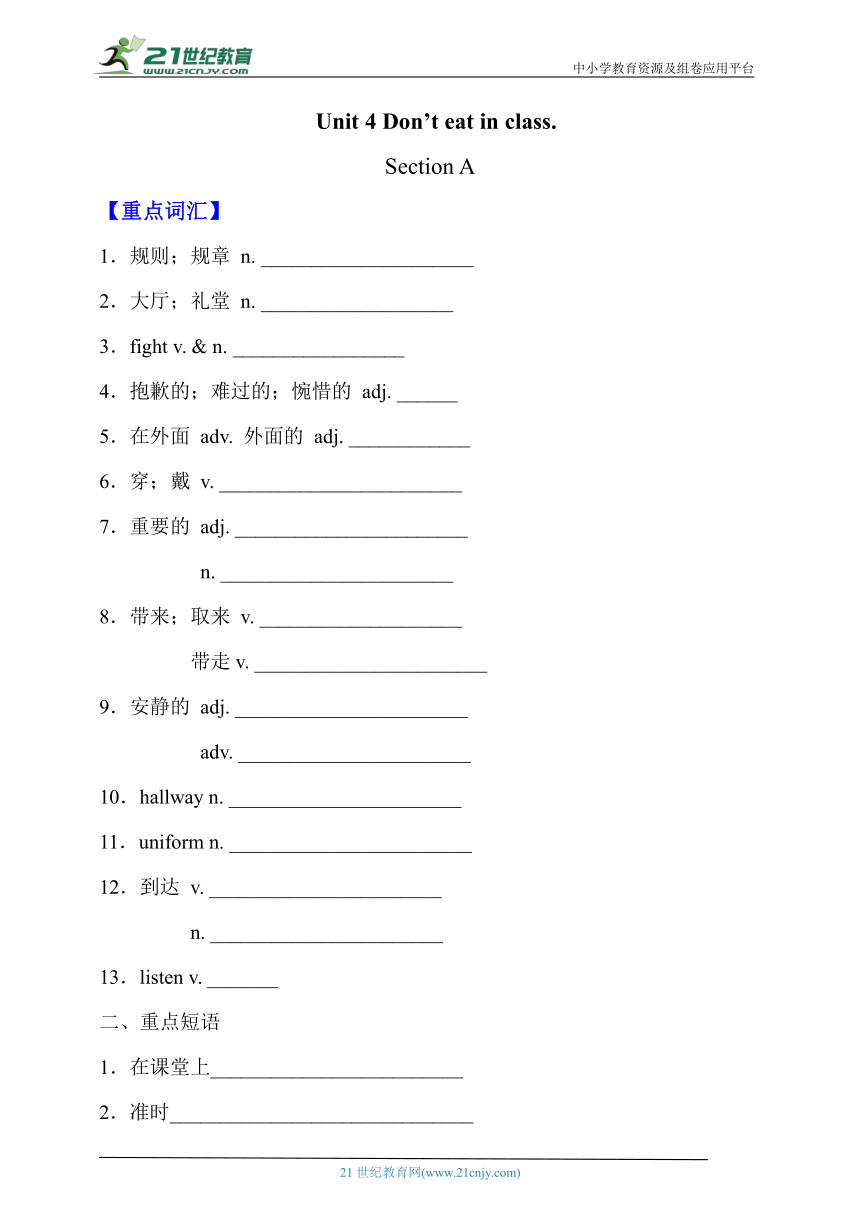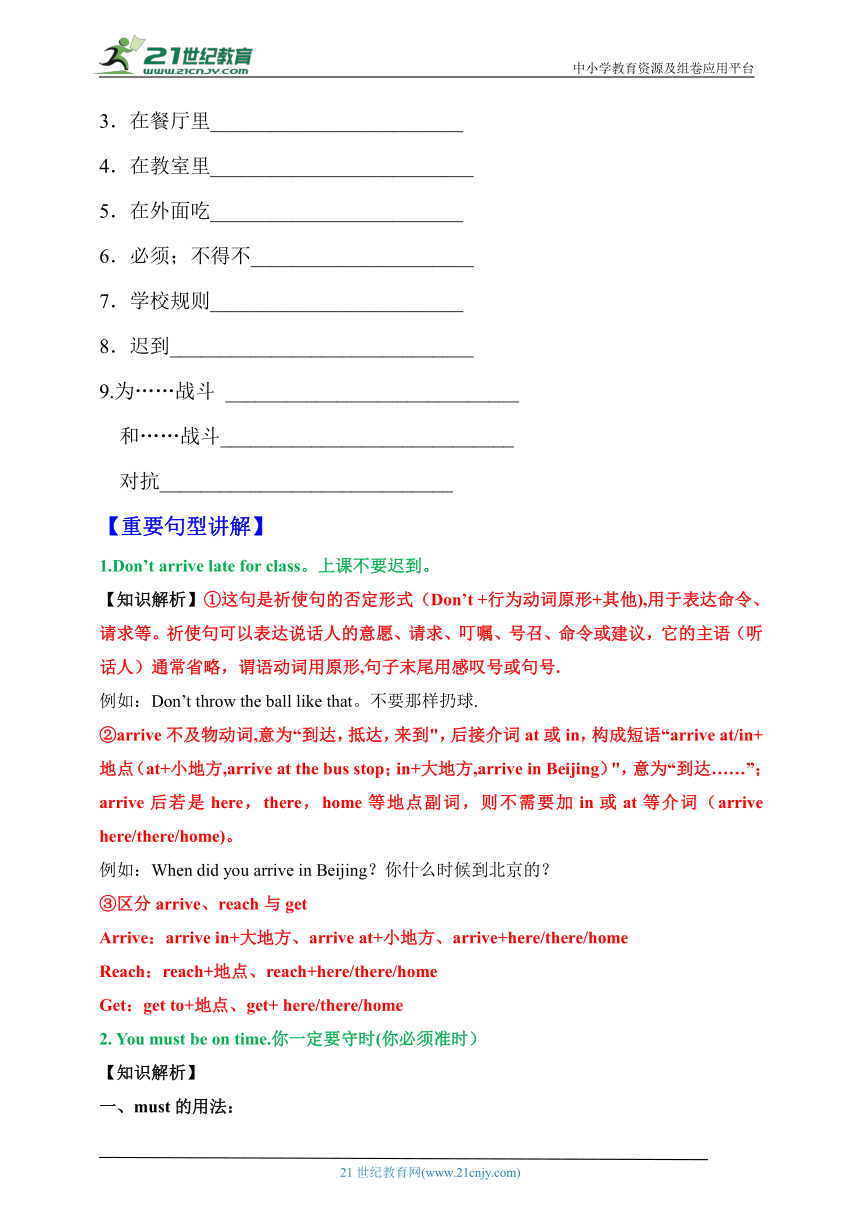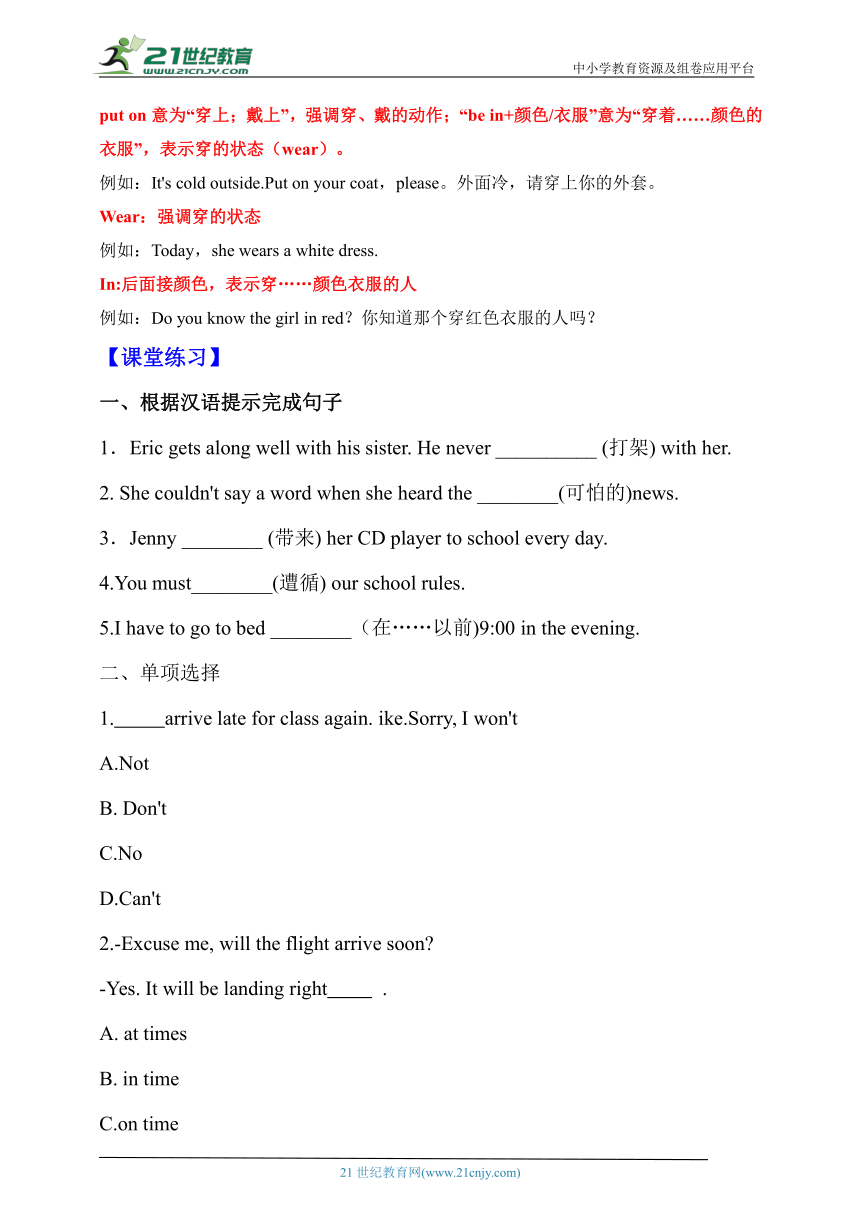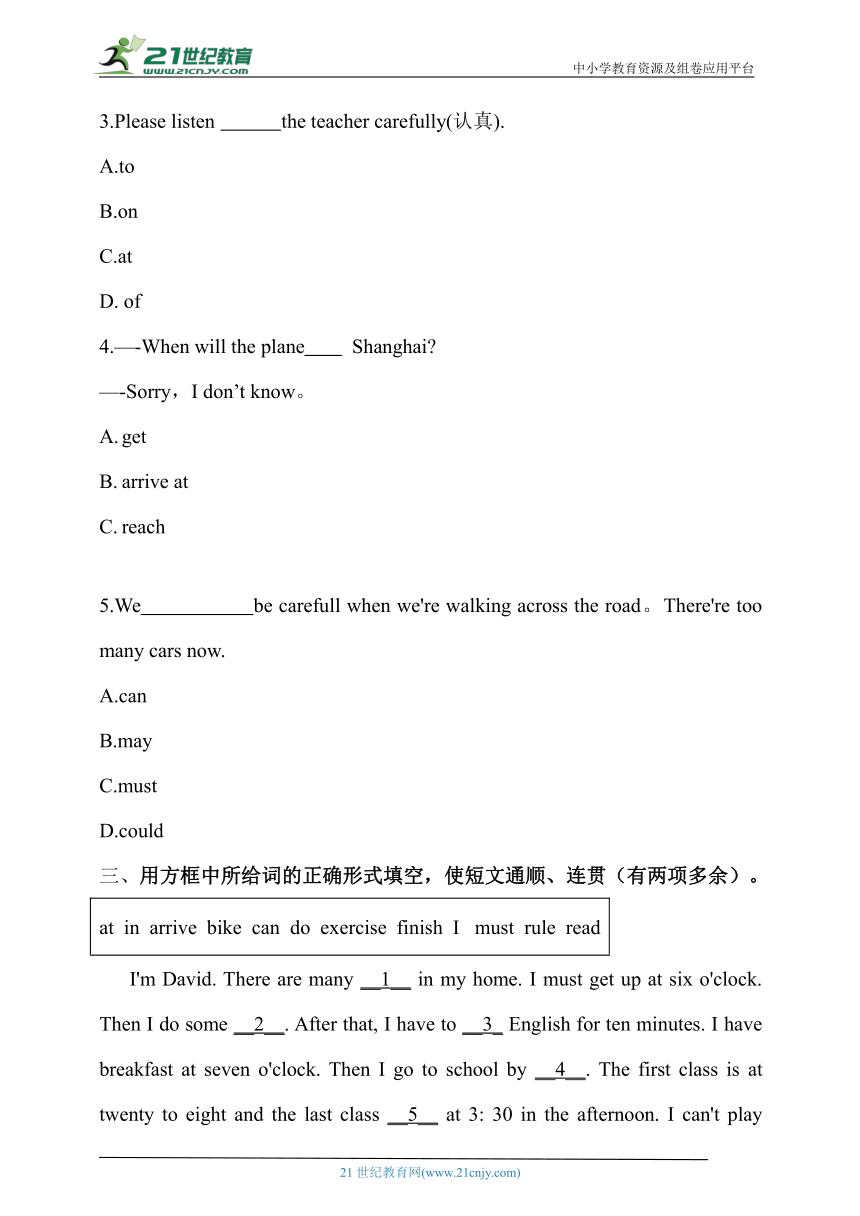人教版七下Unit 4 Don't eat in class. section A 精讲精练(重点词汇+句型+课堂练习)(含解析)
文档属性
| 名称 | 人教版七下Unit 4 Don't eat in class. section A 精讲精练(重点词汇+句型+课堂练习)(含解析) |

|
|
| 格式 | doc | ||
| 文件大小 | 438.1KB | ||
| 资源类型 | 试卷 | ||
| 版本资源 | 人教新目标(Go for it)版 | ||
| 科目 | 英语 | ||
| 更新时间 | 2024-03-19 15:05:46 | ||
图片预览





文档简介
中小学教育资源及组卷应用平台
Unit 4 Don’t eat in class.
Section A
【重点词汇】
1.规则;规章 n. _____________________
2.大厅;礼堂 n. ___________________
3.fight v. & n. _________________
4.抱歉的;难过的;惋惜的 adj. ______
5.在外面 adv. 外面的 adj. ____________
6.穿;戴 v. ________________________
7.重要的 adj. _______________________
n. _______________________
8.带来;取来 v. ____________________
带走v. _______________________
安静的 adj. _______________________
adv. _______________________
10.hallway n. _______________________
11.uniform n. ________________________
12.到达 v. _______________________
n. _______________________
13.listen v. _______
二、重点短语
1.在课堂上_________________________
2.准时______________________________
3.在餐厅里_________________________
4.在教室里__________________________
5.在外面吃_________________________
6.必须;不得不______________________
7.学校规则_________________________
8.迟到______________________________
9. 为……战斗 _____________________________
和……战斗_____________________________
对抗_____________________________
【重要句型讲解】
1.Don’t arrive late for class。上课不要迟到。
【知识解析】①这句是祈使句的否定形式(Don’t +行为动词原形+其他),用于表达命令、请求等。祈使句可以表达说话人的意愿、请求、叮嘱、号召、命令或建议,它的主语(听话人)通常省略,谓语动词用原形,句子末尾用感叹号或句号.
例如:Don’t throw the ball like that。不要那样扔球.
②arrive不及物动词,意为“到达,抵达,来到",后接介词at或in,构成短语“arrive at/in+地点(at+小地方,arrive at the bus stop;in+大地方,arrive in Beijing)",意为“到达……”;arrive后若是here,there,home等地点副词,则不需要加in或at等介词(arrive here/there/home)。
例如:When did you arrive in Beijing?你什么时候到北京的?
③区分arrive、reach与get
Arrive:arrive in+大地方、arrive at+小地方、arrive+here/there/home
Reach:reach+地点、reach+here/there/home
Get:get to+地点、get+ here/there/home
2. You must be on time.你一定要守时(你必须准时)
【知识解析】
一、must的用法:
①must为情态动词,意为“必须,务必,一定”。情态动词不能单独作谓语动词,必须和动词原形一起构成谓语。
例如:You must read a book before you watch TV.
②must用于否定句时,mustn’t意为“千万不要,禁止",而不表示“不必"。
③以must开头的一般疑问句,若作否定回答,可以用needn’t或don't have to,但不能用mustn't(一定不,不允许,不得。如:You mustn’t smoke in the office。你不得在办公室吸烟。)。
二、On time:准时
In time:及时
例如:We must arrive there on time.我们必须按时到达那里。
3. Don’t run in the hallways。不要在走廊里奔跑.
【知识解析】此句是祈使句的否定形式。祈使句是表示请求、命令、劝说、建议等语气的句子.在祈使句中,通常省略第二人称主语you。其肯定句式以动词原形开头,否定句式是在动词原形前加don’t。常在句首或句末加please以示礼貌。句末用please时,前面通常加逗号。
例如:Stop talking!停止谈话!Don’t play football in the street.不要在街上踢足球。
4. Don’t listen to music in class.不要在课堂上听音乐。
【知识解析 】①listen to music意为“听音乐”,其中listen为不及物动词,其后接宾语时,要加介词to。例如:Listen!The girl is singing。听!那个女孩正在唱歌。
【区分】listen 与hear
Listen:强调听的动作
例如:Listen!Someone is singing.
Hear:强调听的结果
Can you hear someone singing
5.wear a hat戴帽子。
【知识解析】wear为及物动词(同音词where;动词形式wear-wears-wearing—wore),意为“穿着;戴着",表示状态。
例如:He wears a black T-shirt.他穿着一件黑色的T恤衫。
She likes wearing a red hat.她喜欢戴一顶红色的帽子。
【区分】put on、wear、in、dress
put on意为“穿上;戴上”,强调穿、戴的动作;“be in+颜色/衣服”意为“穿着……颜色的衣服”,表示穿的状态(wear)。
例如:It's cold outside.Put on your coat,please。外面冷,请穿上你的外套。
Wear:强调穿的状态
例如:Today,she wears a white dress.
In:后面接颜色,表示穿……颜色衣服的人
例如:Do you know the girl in red?你知道那个穿红色衣服的人吗?
【课堂练习】
一、根据汉语提示完成句子
1.Eric gets along well with his sister. He never __________ (打架) with her.
2. She couldn't say a word when she heard the ________(可怕的)news.
3.Jenny ________ (带来) her CD player to school every day.
4.You must________(遭循) our school rules.
5.I have to go to bed ________(在……以前)9:00 in the evening.
单项选择
1. arrive late for class again. ike.Sorry, I won't
A.Not
B. Don't
C.No
D.Can't
2.-Excuse me, will the flight arrive soon
-Yes. It will be landing right .
A. at times
B. in time
C.on time
3.Please listen the teacher carefully(认真).
A.to
B.on
C.at
D. of
4.—-When will the plane Shanghai
—-Sorry,I don’t know。
get
arrive at
reach
5.We be carefull when we're walking across the road。There're too many cars now.
A.can
B.may
C.must
D.could
三、用方框中所给词的正确形式填空,使短文通顺、连贯(有两项多余)。
at in arrive bike can do exercise finish I must rule read
I'm David. There are many __1__ in my home. I must get up at six o'clock. Then I do some __2__. After that, I have to __3_ English for ten minutes. I have breakfast at seven o'clock. Then I go to school by __4__. The first class is at twenty to eight and the last class __5__ at 3: 30 in the afternoon. I can't play games with my classmates after school. I __6__ go home. After___7___ home, I must do my homework first. Then I have to help __8__ mother make dinner. After dinner, I __9__ watch TV for an hour. On the weekend, I have to clean my room and ___10___ the dishes. I can go swimming or play tennis on Sunday afternoon.
四、阅读单选
June 5th is World Environment Day. This makes us pay more attention to our environment. When Wang Boxuan, a Beijing high school student, uses up his exercise books, he does not throw them away. Each one is kept at his school with hundreds of exercise books that are given by other students. Then they are sold to a Beijing paper-making factory.
The paper is recycled and used again by students and teachers in the school. At the same time, the money that is made from the sales goes to schools in Inner Mongolia(内蒙古). The government there uses the money to plant more trees and grass. This place is one of the sources(源头)of the sandstorms(沙尘暴)that often attack Beijing during springtime.
Wang's school is one of the schools in the capital that take part in the \"green promise" environmental protection activity. So far, nearly210,000 students have taken part in the activity, collecting more than 87 tons of waste paper.
(1)Wang Boxuan and his schoolmates waste exercise books.
A. throw away B. keep and sell
C. cut up D. give away
(2)The money made from the sales is used to .
A. buy new exercise books B. help poor students
C. plant trees and grass D. be kept
(3)From the third paragraph, we can know that .
A. many years from now, students will have no exercise books to use
B. many years from now, there will be no waste paper
C. many years from now, the sandstorms will be less serious in Beijing
D. many years from now, Beijing will be much dirtier
(4)World Environment Day is on .
A. June 15th B. July 15th
C. June 5th D. July 5th
(5)Which of the following is RIGHT
A. The paper is recycled and used again by students and teachers in the school.
B. So far, all students have taken part in the activity, collecting more than 87tons of waste paper.
C. At the same time, the money that is made from the sales goes to schools in Beijing.
D. Each one is kept at his school with few exercise books that are given by other students.
一、【答案】1.fights
【解析】句意:埃里克和他妹妹相处得很好。他从不和她吵架。fight“打架”,句子是一般现在时,主语he是第三人称单数,动词用三单形式,故填fights。
【答案】2.brings
【解析】句意:Jenny每天都带她的CD播放器去学校。根据时态是一般现在时,主语Jenny是第三人称单数,所以用动词bring“带来”的第三人称单数形式brings,故填brings。
【答案】3.terrible
【详解】句意:她听到这个可怕的消息时,一句话也说不出来。“可怕的”英文表达为“temible”,形容词,作定语。故填terrible。
【答案】4.follow
【解析】句意:你必须遵循我们的校规。follow“道循”,must后接动词原形,故填follow。
【答案】5.before
【详解】句意:我必须在晚上9点之前上床睡觉。before在…以前,时间介词,故填before。
二、【答案】1.B
【详解】句意:--上课不要再迟到了,迈克。--对不起,我不会了。根据句子结构arrive late for class again,Mike可知这里是省略主语的祈使句,祈使句的否定形式在动词前加don't;故选B。
【答案】2.C
【解析】句意:--打扰了,航班不久会到吗 --是的。它会按时降落。
考查介词辨析。at times有时;in time及时;on time按时。根据“It wil be landing right”可知,飞机会按时降落,故选C。
【答案】3.A
【解析】句意:请认真地听老师讲课。
考查介词辨析。to到;on在.……上;at在;of的。短语listen to sb.表示“听某人(讲话)”,固定搭配,此处指“认真听老师讲课”。故选A。
【答案】4.C
【解析】(get为不及物动词,表示到达某地时用get to,故排除A;arrive为不及物动词,arrive at后接小地点,arrive in后接大地点,由空格后Shanghai(上海)可排除B;reach为及物动词,后可直接跟地点,答案:C。)
【答案】5.C
【解析】(can“能,能够";may“可以”;must“必须,一定”;could“可能”。由句意“当我们过马路的时候必须小心,现在有太多车.”可知C项符合题意.)
三、【分析】文章主要是讲述了大卫家的一些规矩很多。以及具体的规矩有哪些。
【答案】1.句意:我家有很多规矩。
根据句意理解及后句I must get up at six o’clock. 我必须六点钟起床。可知这里表达的是“家里有一些规矩”,所以这里应该填rule,而空格前有many修饰,所以这里应该用复数形式,故答案为rules。
【答案】2.句意:然后我做些运动。
根据句意理解可知,这里表达的是“运动”,英语是exercise,在这里是一个不可数名词,所以这里直接用单词本身,故答案为exercise。
【答案】3.句意:之后,我必须读十分钟英语。
根据句意理解可知,这里表达的是“读英语”,英语中“读”是read,而空格前有have to,所以空格应该用动词原形,故答案为read。
【答案】4.句意:然后我骑自行车上学。
根据句意理解可知,这里表达的是“骑自行车”,空格前有介词by,在这里可以构成一个固定短语by bike,表示“骑自行车”,所以这里直接用bike,故答案为bike。
【答案】5.句意:最后一节课在下午三点半结束。
根据句意理解及前句The first class is at twenty to eight第一节课在七点四十分开始。可知这里用and并列,前后表达的内容应该是相近的,所以这里指的是“最后一节课结束在……”,英语中“结束”是finish,前句用的是一般现在时,所以后句也用一般现在时,句子主语是the last class,所以动词应该用三单形式,故答案为finishes。
【答案】6.句意:我必须回家。
根据句意理解及前句I can’t play games with my classmates after school. 放学后我不能和同学们玩游戏。可知这里表达的是 “必须”,英语是must,是一个情态动词,后面接动词原形,故答案为must。
【答案】7.句意:到家后,……。
根据句意理解及后句I must do my homework first. 我必须先做作业。可知这里表达的是“到家后”,英语中“到达”是arrive,而空格前的after是一个介词,介词后面接动词ing形式,所以这里应该用arriving,故答案为arriving。
【答案】8.句意:然后我得帮妈妈做晚饭。
根据句意理解可知,这里表达的是“我妈妈”,空格表达的是“我的”,英语是my或者mine,而空格后面有名词mother,所以应该用形容词性的物主代词,故答案为my。
【答案】9.句意:晚饭后,我可以看一个小时的电视。
根据句意理解可知,这里表达的是“能,可以”,英语是情态动词can,且空格后面是动词原形watch,所以这里直接用can,故答案为can。
【答案】10.句意:周末,我得打扫房间洗碗。
根据句意理解可知,这里表达的是“洗餐具”,英语是do the dishes,是一个固定短语,and并列前句用的是clean动词原形,所以后面的句子也用动词原形,所以这里应该用do,故答案为do。
四、【答案】 (1)B(2)C(3)C(4)C(5)A
【解析】【分析】文章大意:作者在文中介绍了在北京一所中学同学们关于废纸回收利用的一些事情,最后向人们提出了保护环境的倡议。
(1)理解归纳题。根据文中第二自然段的语句理解可知,王将废纸放在了回收袋,然后卖掉,故选B。
(2)细节理解题,根据文中语句“At the same time,the money made from selling the paper goes towards schools in Inner Mongolia for planting trees and grass.”理解可知。卖废纸的钱用来植树和草坪,故选C。
(3)理解归纳题,根据文中第三自然段的语句理解可知,北京的沙尘暴会在几年以后变得越来越少,故选C。
(4)细节理解题,根据文中的语句 June 5th is World Environment Day. 理解可知,世界环境日是六月五号,故选C。
(5)细节理解题,根据文中第二段的第一句话,可知选项A是正确的;由 So far, nearly210,000 students have taken part in the activity, collecting more than 87 tons of waste paper. 可知选项B是错误的;由 At the same time, the money that is made from the sales goes to schools in Inner Mongolia(内蒙古). 可知选项C是错误的;由 Each one is kept at his school with hundreds of exercise books that are given by other students. 可知,选项D是错误的,故选A。
【点评】考查阅读理解。答题前要先读懂全文,然后带着问题再读全文,找出答题依据,完成阅读。
21世纪教育网 www.21cnjy.com 精品试卷·第 2 页 (共 2 页)
HYPERLINK "http://21世纪教育网(www.21cnjy.com)
" 21世纪教育网(www.21cnjy.com)
Unit 4 Don’t eat in class.
Section A
【重点词汇】
1.规则;规章 n. _____________________
2.大厅;礼堂 n. ___________________
3.fight v. & n. _________________
4.抱歉的;难过的;惋惜的 adj. ______
5.在外面 adv. 外面的 adj. ____________
6.穿;戴 v. ________________________
7.重要的 adj. _______________________
n. _______________________
8.带来;取来 v. ____________________
带走v. _______________________
安静的 adj. _______________________
adv. _______________________
10.hallway n. _______________________
11.uniform n. ________________________
12.到达 v. _______________________
n. _______________________
13.listen v. _______
二、重点短语
1.在课堂上_________________________
2.准时______________________________
3.在餐厅里_________________________
4.在教室里__________________________
5.在外面吃_________________________
6.必须;不得不______________________
7.学校规则_________________________
8.迟到______________________________
9. 为……战斗 _____________________________
和……战斗_____________________________
对抗_____________________________
【重要句型讲解】
1.Don’t arrive late for class。上课不要迟到。
【知识解析】①这句是祈使句的否定形式(Don’t +行为动词原形+其他),用于表达命令、请求等。祈使句可以表达说话人的意愿、请求、叮嘱、号召、命令或建议,它的主语(听话人)通常省略,谓语动词用原形,句子末尾用感叹号或句号.
例如:Don’t throw the ball like that。不要那样扔球.
②arrive不及物动词,意为“到达,抵达,来到",后接介词at或in,构成短语“arrive at/in+地点(at+小地方,arrive at the bus stop;in+大地方,arrive in Beijing)",意为“到达……”;arrive后若是here,there,home等地点副词,则不需要加in或at等介词(arrive here/there/home)。
例如:When did you arrive in Beijing?你什么时候到北京的?
③区分arrive、reach与get
Arrive:arrive in+大地方、arrive at+小地方、arrive+here/there/home
Reach:reach+地点、reach+here/there/home
Get:get to+地点、get+ here/there/home
2. You must be on time.你一定要守时(你必须准时)
【知识解析】
一、must的用法:
①must为情态动词,意为“必须,务必,一定”。情态动词不能单独作谓语动词,必须和动词原形一起构成谓语。
例如:You must read a book before you watch TV.
②must用于否定句时,mustn’t意为“千万不要,禁止",而不表示“不必"。
③以must开头的一般疑问句,若作否定回答,可以用needn’t或don't have to,但不能用mustn't(一定不,不允许,不得。如:You mustn’t smoke in the office。你不得在办公室吸烟。)。
二、On time:准时
In time:及时
例如:We must arrive there on time.我们必须按时到达那里。
3. Don’t run in the hallways。不要在走廊里奔跑.
【知识解析】此句是祈使句的否定形式。祈使句是表示请求、命令、劝说、建议等语气的句子.在祈使句中,通常省略第二人称主语you。其肯定句式以动词原形开头,否定句式是在动词原形前加don’t。常在句首或句末加please以示礼貌。句末用please时,前面通常加逗号。
例如:Stop talking!停止谈话!Don’t play football in the street.不要在街上踢足球。
4. Don’t listen to music in class.不要在课堂上听音乐。
【知识解析 】①listen to music意为“听音乐”,其中listen为不及物动词,其后接宾语时,要加介词to。例如:Listen!The girl is singing。听!那个女孩正在唱歌。
【区分】listen 与hear
Listen:强调听的动作
例如:Listen!Someone is singing.
Hear:强调听的结果
Can you hear someone singing
5.wear a hat戴帽子。
【知识解析】wear为及物动词(同音词where;动词形式wear-wears-wearing—wore),意为“穿着;戴着",表示状态。
例如:He wears a black T-shirt.他穿着一件黑色的T恤衫。
She likes wearing a red hat.她喜欢戴一顶红色的帽子。
【区分】put on、wear、in、dress
put on意为“穿上;戴上”,强调穿、戴的动作;“be in+颜色/衣服”意为“穿着……颜色的衣服”,表示穿的状态(wear)。
例如:It's cold outside.Put on your coat,please。外面冷,请穿上你的外套。
Wear:强调穿的状态
例如:Today,she wears a white dress.
In:后面接颜色,表示穿……颜色衣服的人
例如:Do you know the girl in red?你知道那个穿红色衣服的人吗?
【课堂练习】
一、根据汉语提示完成句子
1.Eric gets along well with his sister. He never __________ (打架) with her.
2. She couldn't say a word when she heard the ________(可怕的)news.
3.Jenny ________ (带来) her CD player to school every day.
4.You must________(遭循) our school rules.
5.I have to go to bed ________(在……以前)9:00 in the evening.
单项选择
1. arrive late for class again. ike.Sorry, I won't
A.Not
B. Don't
C.No
D.Can't
2.-Excuse me, will the flight arrive soon
-Yes. It will be landing right .
A. at times
B. in time
C.on time
3.Please listen the teacher carefully(认真).
A.to
B.on
C.at
D. of
4.—-When will the plane Shanghai
—-Sorry,I don’t know。
get
arrive at
reach
5.We be carefull when we're walking across the road。There're too many cars now.
A.can
B.may
C.must
D.could
三、用方框中所给词的正确形式填空,使短文通顺、连贯(有两项多余)。
at in arrive bike can do exercise finish I must rule read
I'm David. There are many __1__ in my home. I must get up at six o'clock. Then I do some __2__. After that, I have to __3_ English for ten minutes. I have breakfast at seven o'clock. Then I go to school by __4__. The first class is at twenty to eight and the last class __5__ at 3: 30 in the afternoon. I can't play games with my classmates after school. I __6__ go home. After___7___ home, I must do my homework first. Then I have to help __8__ mother make dinner. After dinner, I __9__ watch TV for an hour. On the weekend, I have to clean my room and ___10___ the dishes. I can go swimming or play tennis on Sunday afternoon.
四、阅读单选
June 5th is World Environment Day. This makes us pay more attention to our environment. When Wang Boxuan, a Beijing high school student, uses up his exercise books, he does not throw them away. Each one is kept at his school with hundreds of exercise books that are given by other students. Then they are sold to a Beijing paper-making factory.
The paper is recycled and used again by students and teachers in the school. At the same time, the money that is made from the sales goes to schools in Inner Mongolia(内蒙古). The government there uses the money to plant more trees and grass. This place is one of the sources(源头)of the sandstorms(沙尘暴)that often attack Beijing during springtime.
Wang's school is one of the schools in the capital that take part in the \"green promise" environmental protection activity. So far, nearly210,000 students have taken part in the activity, collecting more than 87 tons of waste paper.
(1)Wang Boxuan and his schoolmates waste exercise books.
A. throw away B. keep and sell
C. cut up D. give away
(2)The money made from the sales is used to .
A. buy new exercise books B. help poor students
C. plant trees and grass D. be kept
(3)From the third paragraph, we can know that .
A. many years from now, students will have no exercise books to use
B. many years from now, there will be no waste paper
C. many years from now, the sandstorms will be less serious in Beijing
D. many years from now, Beijing will be much dirtier
(4)World Environment Day is on .
A. June 15th B. July 15th
C. June 5th D. July 5th
(5)Which of the following is RIGHT
A. The paper is recycled and used again by students and teachers in the school.
B. So far, all students have taken part in the activity, collecting more than 87tons of waste paper.
C. At the same time, the money that is made from the sales goes to schools in Beijing.
D. Each one is kept at his school with few exercise books that are given by other students.
一、【答案】1.fights
【解析】句意:埃里克和他妹妹相处得很好。他从不和她吵架。fight“打架”,句子是一般现在时,主语he是第三人称单数,动词用三单形式,故填fights。
【答案】2.brings
【解析】句意:Jenny每天都带她的CD播放器去学校。根据时态是一般现在时,主语Jenny是第三人称单数,所以用动词bring“带来”的第三人称单数形式brings,故填brings。
【答案】3.terrible
【详解】句意:她听到这个可怕的消息时,一句话也说不出来。“可怕的”英文表达为“temible”,形容词,作定语。故填terrible。
【答案】4.follow
【解析】句意:你必须遵循我们的校规。follow“道循”,must后接动词原形,故填follow。
【答案】5.before
【详解】句意:我必须在晚上9点之前上床睡觉。before在…以前,时间介词,故填before。
二、【答案】1.B
【详解】句意:--上课不要再迟到了,迈克。--对不起,我不会了。根据句子结构arrive late for class again,Mike可知这里是省略主语的祈使句,祈使句的否定形式在动词前加don't;故选B。
【答案】2.C
【解析】句意:--打扰了,航班不久会到吗 --是的。它会按时降落。
考查介词辨析。at times有时;in time及时;on time按时。根据“It wil be landing right”可知,飞机会按时降落,故选C。
【答案】3.A
【解析】句意:请认真地听老师讲课。
考查介词辨析。to到;on在.……上;at在;of的。短语listen to sb.表示“听某人(讲话)”,固定搭配,此处指“认真听老师讲课”。故选A。
【答案】4.C
【解析】(get为不及物动词,表示到达某地时用get to,故排除A;arrive为不及物动词,arrive at后接小地点,arrive in后接大地点,由空格后Shanghai(上海)可排除B;reach为及物动词,后可直接跟地点,答案:C。)
【答案】5.C
【解析】(can“能,能够";may“可以”;must“必须,一定”;could“可能”。由句意“当我们过马路的时候必须小心,现在有太多车.”可知C项符合题意.)
三、【分析】文章主要是讲述了大卫家的一些规矩很多。以及具体的规矩有哪些。
【答案】1.句意:我家有很多规矩。
根据句意理解及后句I must get up at six o’clock. 我必须六点钟起床。可知这里表达的是“家里有一些规矩”,所以这里应该填rule,而空格前有many修饰,所以这里应该用复数形式,故答案为rules。
【答案】2.句意:然后我做些运动。
根据句意理解可知,这里表达的是“运动”,英语是exercise,在这里是一个不可数名词,所以这里直接用单词本身,故答案为exercise。
【答案】3.句意:之后,我必须读十分钟英语。
根据句意理解可知,这里表达的是“读英语”,英语中“读”是read,而空格前有have to,所以空格应该用动词原形,故答案为read。
【答案】4.句意:然后我骑自行车上学。
根据句意理解可知,这里表达的是“骑自行车”,空格前有介词by,在这里可以构成一个固定短语by bike,表示“骑自行车”,所以这里直接用bike,故答案为bike。
【答案】5.句意:最后一节课在下午三点半结束。
根据句意理解及前句The first class is at twenty to eight第一节课在七点四十分开始。可知这里用and并列,前后表达的内容应该是相近的,所以这里指的是“最后一节课结束在……”,英语中“结束”是finish,前句用的是一般现在时,所以后句也用一般现在时,句子主语是the last class,所以动词应该用三单形式,故答案为finishes。
【答案】6.句意:我必须回家。
根据句意理解及前句I can’t play games with my classmates after school. 放学后我不能和同学们玩游戏。可知这里表达的是 “必须”,英语是must,是一个情态动词,后面接动词原形,故答案为must。
【答案】7.句意:到家后,……。
根据句意理解及后句I must do my homework first. 我必须先做作业。可知这里表达的是“到家后”,英语中“到达”是arrive,而空格前的after是一个介词,介词后面接动词ing形式,所以这里应该用arriving,故答案为arriving。
【答案】8.句意:然后我得帮妈妈做晚饭。
根据句意理解可知,这里表达的是“我妈妈”,空格表达的是“我的”,英语是my或者mine,而空格后面有名词mother,所以应该用形容词性的物主代词,故答案为my。
【答案】9.句意:晚饭后,我可以看一个小时的电视。
根据句意理解可知,这里表达的是“能,可以”,英语是情态动词can,且空格后面是动词原形watch,所以这里直接用can,故答案为can。
【答案】10.句意:周末,我得打扫房间洗碗。
根据句意理解可知,这里表达的是“洗餐具”,英语是do the dishes,是一个固定短语,and并列前句用的是clean动词原形,所以后面的句子也用动词原形,所以这里应该用do,故答案为do。
四、【答案】 (1)B(2)C(3)C(4)C(5)A
【解析】【分析】文章大意:作者在文中介绍了在北京一所中学同学们关于废纸回收利用的一些事情,最后向人们提出了保护环境的倡议。
(1)理解归纳题。根据文中第二自然段的语句理解可知,王将废纸放在了回收袋,然后卖掉,故选B。
(2)细节理解题,根据文中语句“At the same time,the money made from selling the paper goes towards schools in Inner Mongolia for planting trees and grass.”理解可知。卖废纸的钱用来植树和草坪,故选C。
(3)理解归纳题,根据文中第三自然段的语句理解可知,北京的沙尘暴会在几年以后变得越来越少,故选C。
(4)细节理解题,根据文中的语句 June 5th is World Environment Day. 理解可知,世界环境日是六月五号,故选C。
(5)细节理解题,根据文中第二段的第一句话,可知选项A是正确的;由 So far, nearly210,000 students have taken part in the activity, collecting more than 87 tons of waste paper. 可知选项B是错误的;由 At the same time, the money that is made from the sales goes to schools in Inner Mongolia(内蒙古). 可知选项C是错误的;由 Each one is kept at his school with hundreds of exercise books that are given by other students. 可知,选项D是错误的,故选A。
【点评】考查阅读理解。答题前要先读懂全文,然后带着问题再读全文,找出答题依据,完成阅读。
21世纪教育网 www.21cnjy.com 精品试卷·第 2 页 (共 2 页)
HYPERLINK "http://21世纪教育网(www.21cnjy.com)
" 21世纪教育网(www.21cnjy.com)
同课章节目录
- Unit 1 Can you play the guitar?
- Section A
- Section B
- Unit 2 What time do you go to school?
- Section A
- Section B
- Unit 3 How do you get to school?
- Section A
- Section B
- Unit 4 Don't eat in class.
- Section A
- Section B
- Unit 5 Why do you like pandas?
- Section A
- Section B
- Unit 6 I'm watching TV.
- Section A
- Section B
- Review of Units 1-6
- Unit 7 It's raining!
- Section A
- Section B
- Unit 8 Is there a post office near here?
- Section A
- Section B
- Unit 9 What does he look like?
- Section A
- Section B
- Unit 10 I'd like some noodles.
- Section A
- Section B
- Unit 11 How was your school trip?
- Section A
- Section B
- Unit 12 What did you do last weekend?
- Section A
- Section B
